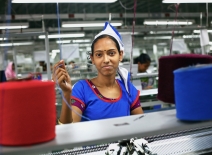Common Framework for Responsible Purchasing Practices in Food

The framework is a reference point to support companies to engage with stakeholders and take practical action to improve their purchasing practices, creating an enabling environment for better labour standards in their supply chains.
A company’s every-day purchasing practices have significant influence on the conditions for workers in the supply chain.
Investing time and resources into reviewing and improving purchasing practices and building a partnership approach with suppliers can have significant benefits to businesses, including a more stable and reliable supply chain and efficiency gains through better communication, planning, and purchasing processes.
Companies have a responsibility to undertake human rights due diligence, seeking to understand how their own commercial behaviours relate to the risks in their supply chains and take corrective action accordingly.
ETI promotes 5 principles of responsible purchasing through several initiatives that span our sector groups of company members.
The common framework for responsible purchasing practices:
The common framework provides an outline of RPPs, to support companies to engage with stakeholders and take practical action to create an enabling environment for good labour standards in their supply chains. It breaks down the broad subject of purchasing practices into five overarching principles, a ‘common language’ by which to structure effective implementation.
The original common framework was developed by the Ethical Trading Initiative (ETI),Ethical Trade Norway, Fair Wear, the German Partnership for Sustainable Textiles (PST), and the Dutch Agreement for Sustainable Garments (AGT), for the apparel and footwear sector. It was based on an extensive benchmarking of literature on RPPs, collating the themes and content to produce the ‘five principles’, and involved wide stakeholder consultation.
Following further consultation, ETI developed the common framework for RPPs in food, amending the ‘practices’ under each principle, to be appropriate to the food industry. The industry includes many varied product types, sectors and processes, for which ‘responsible purchasing practices’ may vary (e.g. fresh produce, smallholders, seafood, commodities etc). This framework acts as a core reference document, to provide a common language and structure for discussion and action, after which guidelines for different elements of the industry may be developed.
ETI responsible purchasing practices support & training

Mining of metals & minerals


